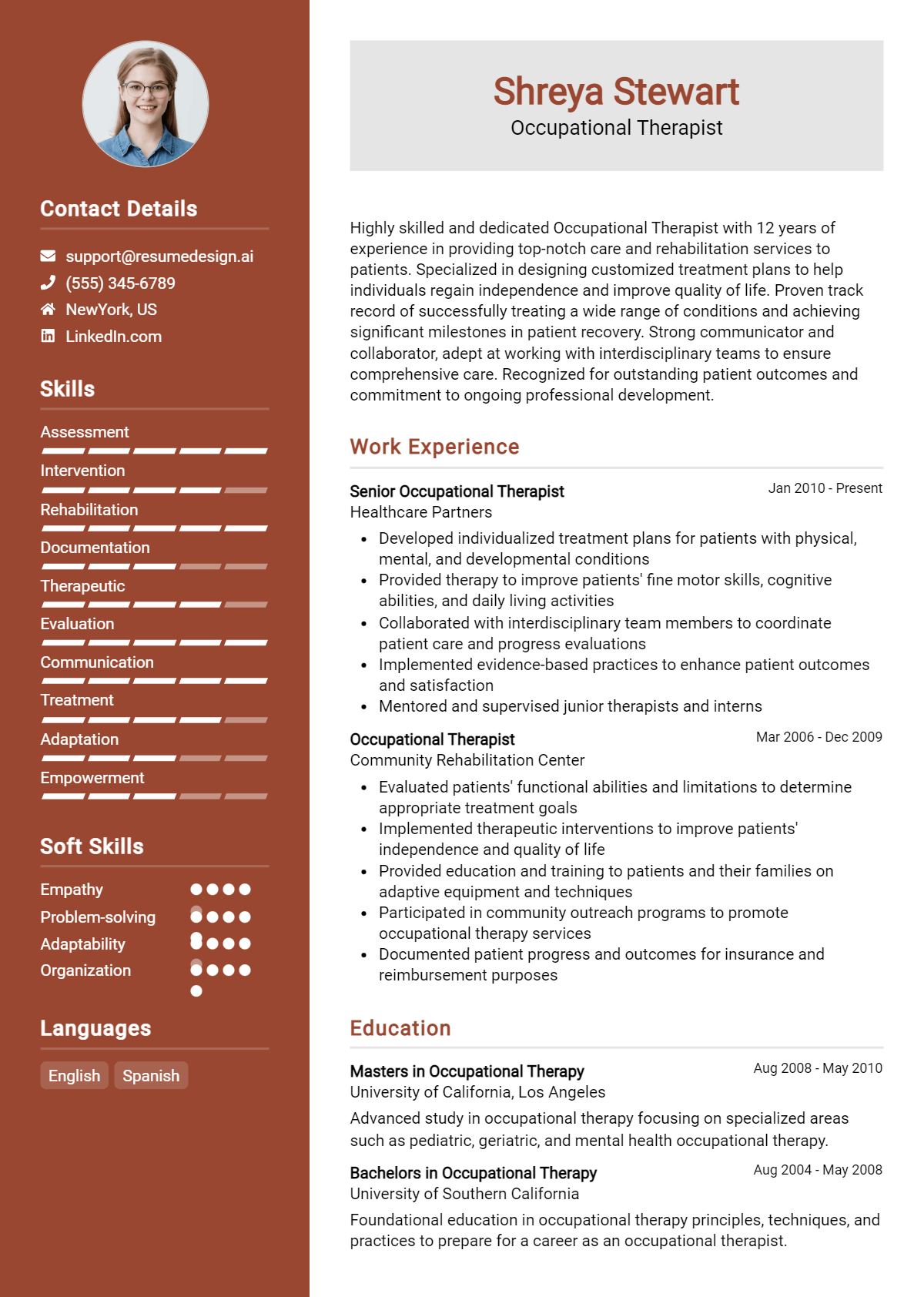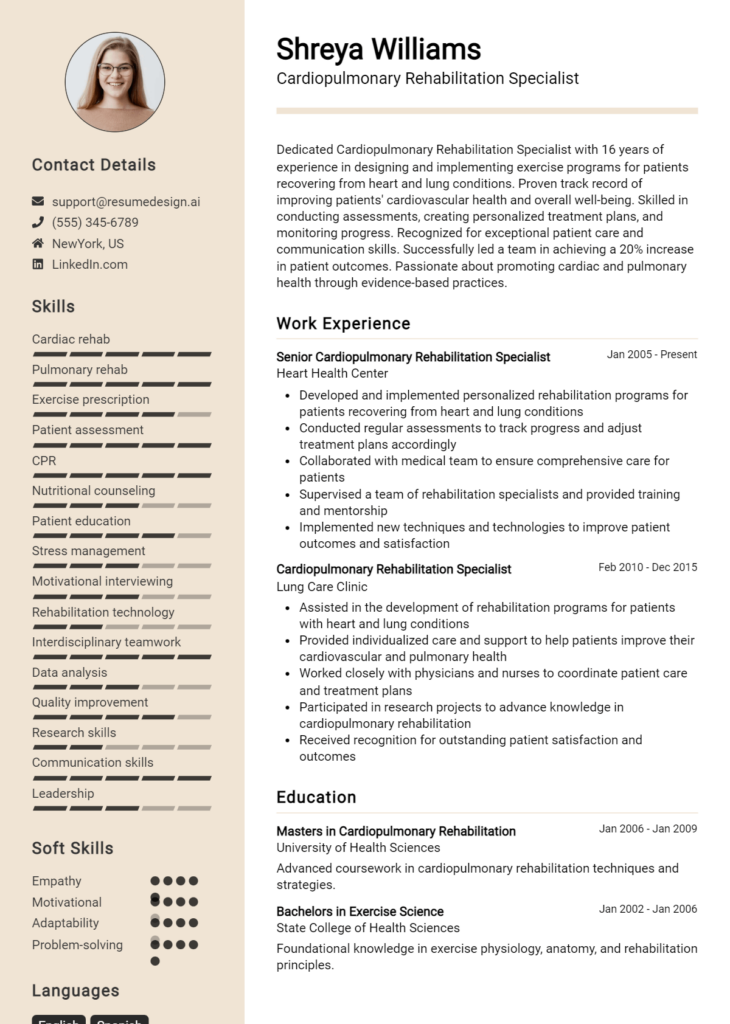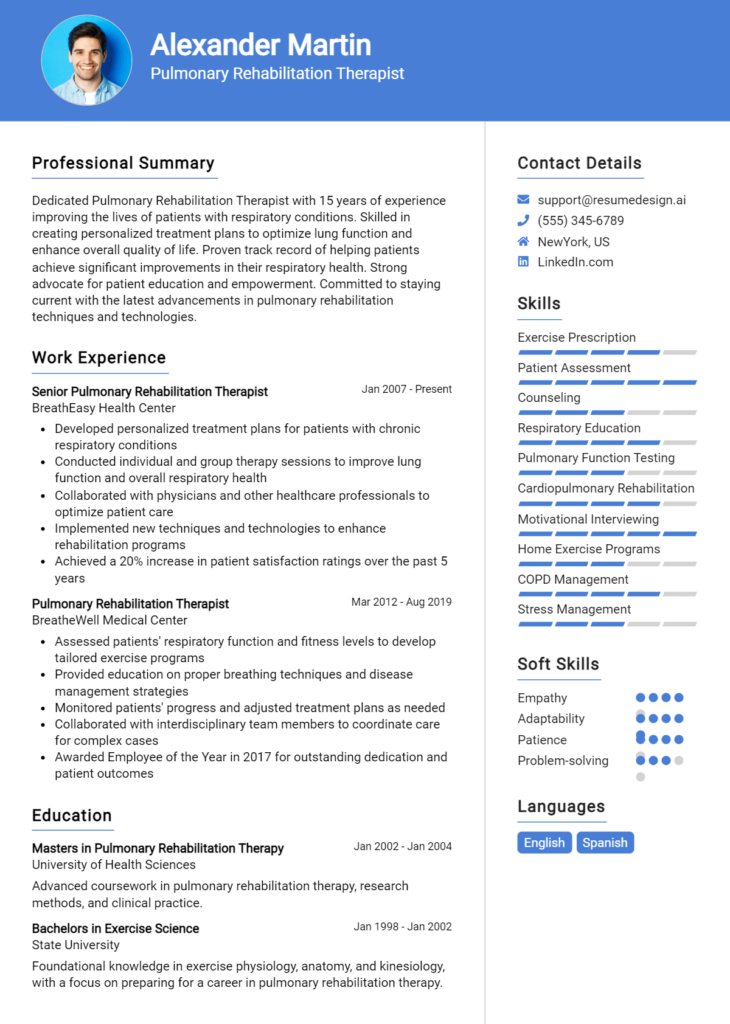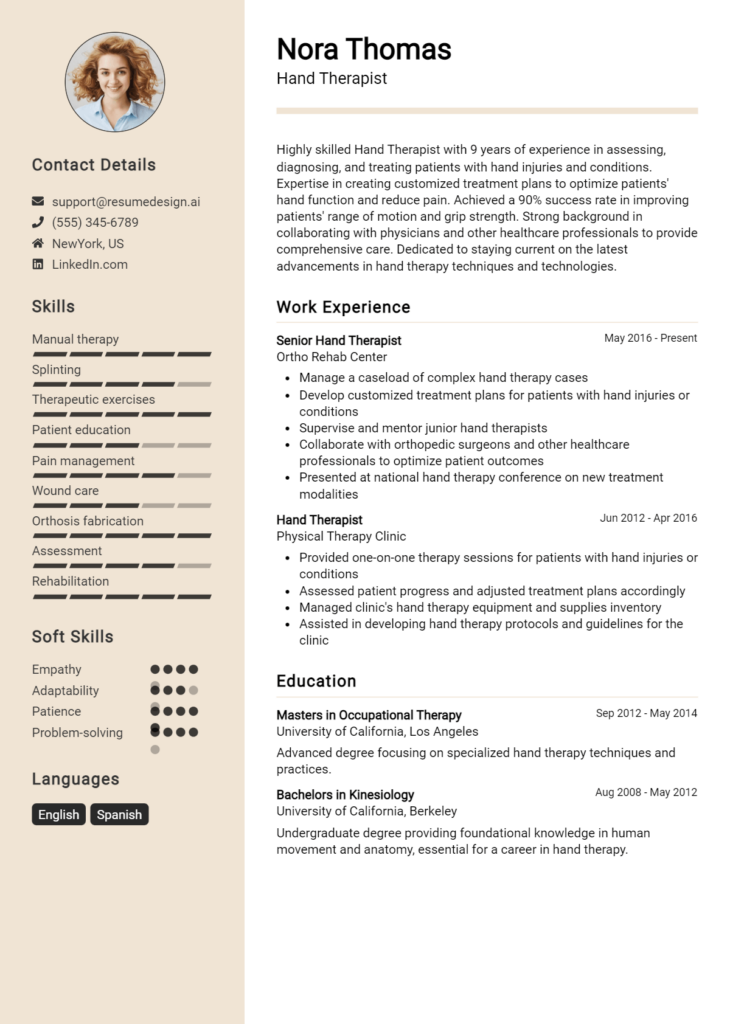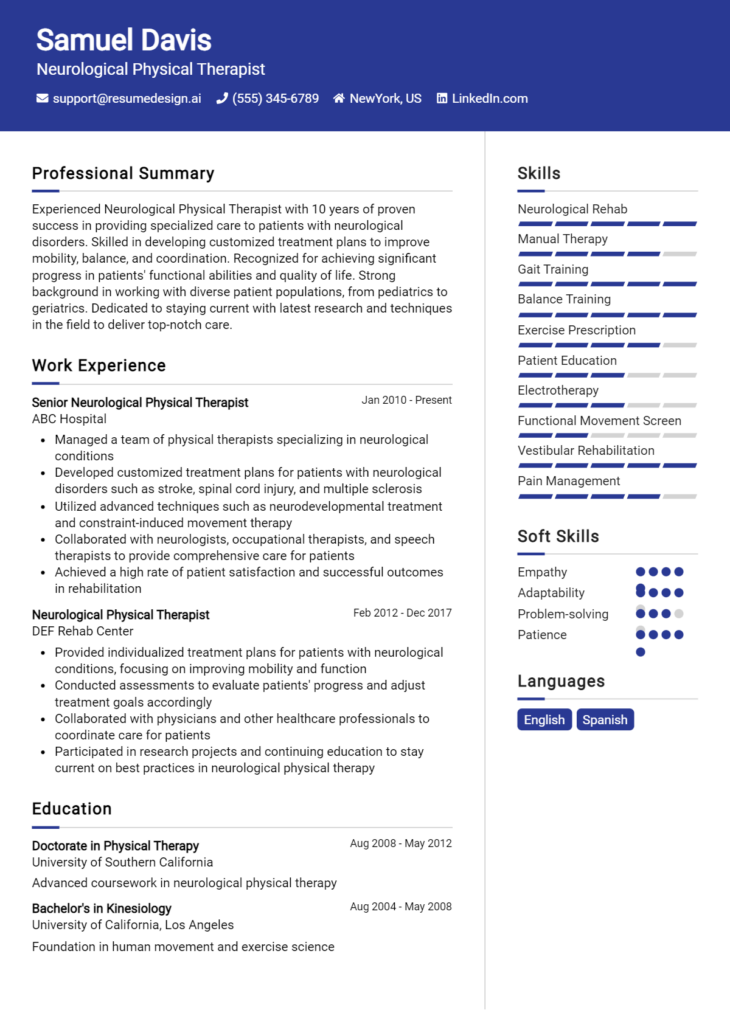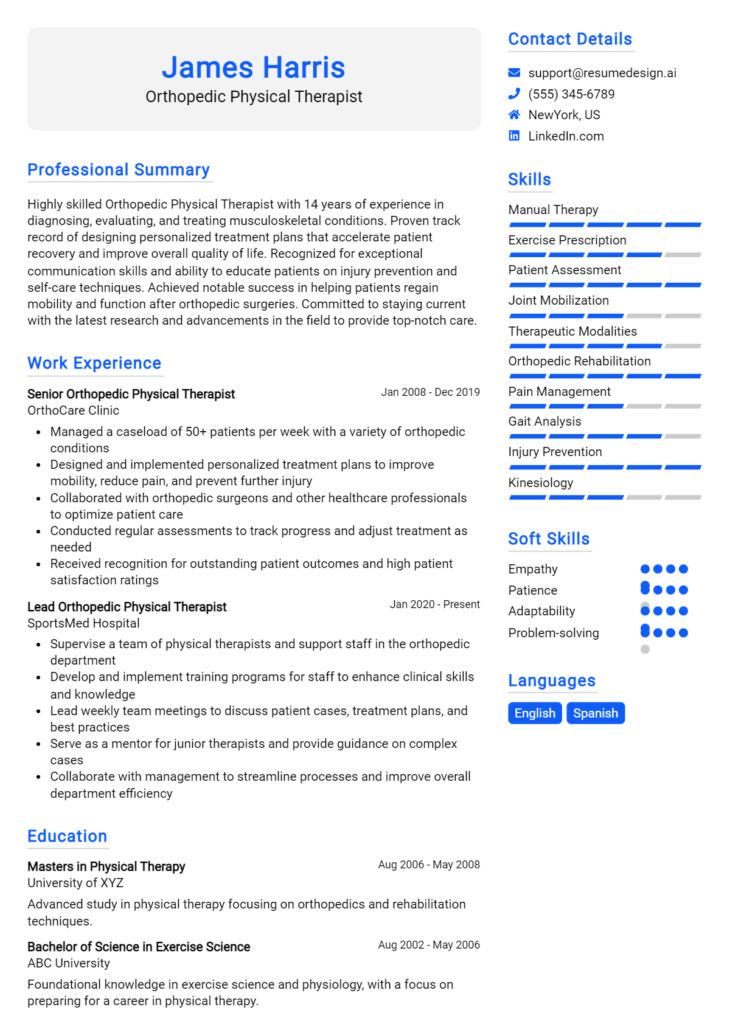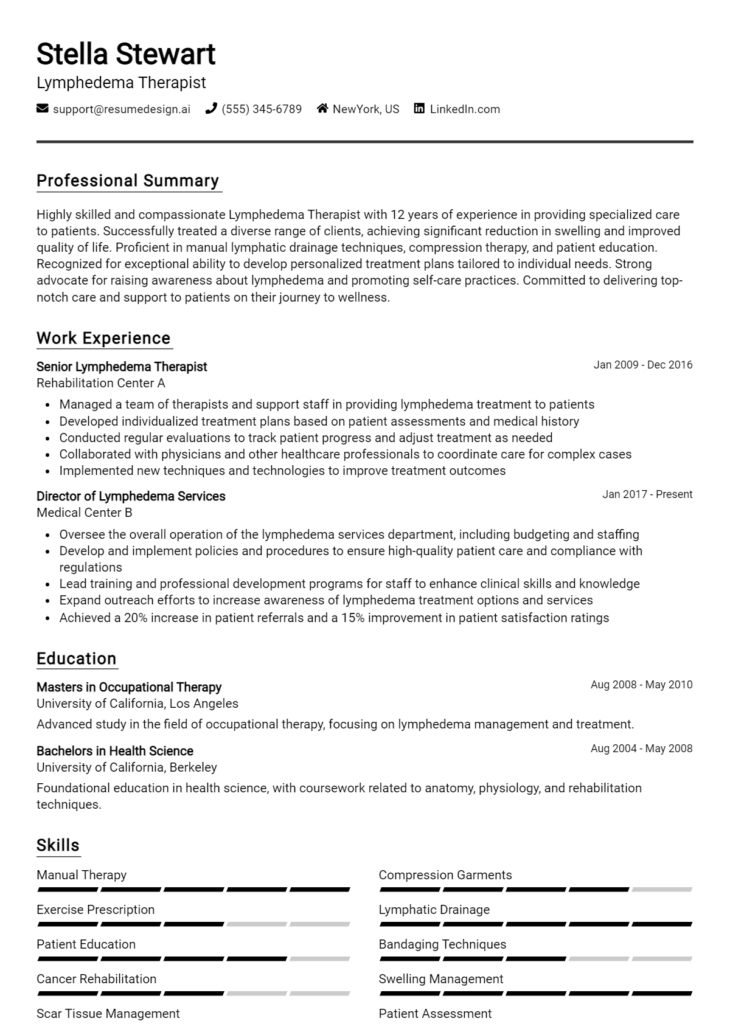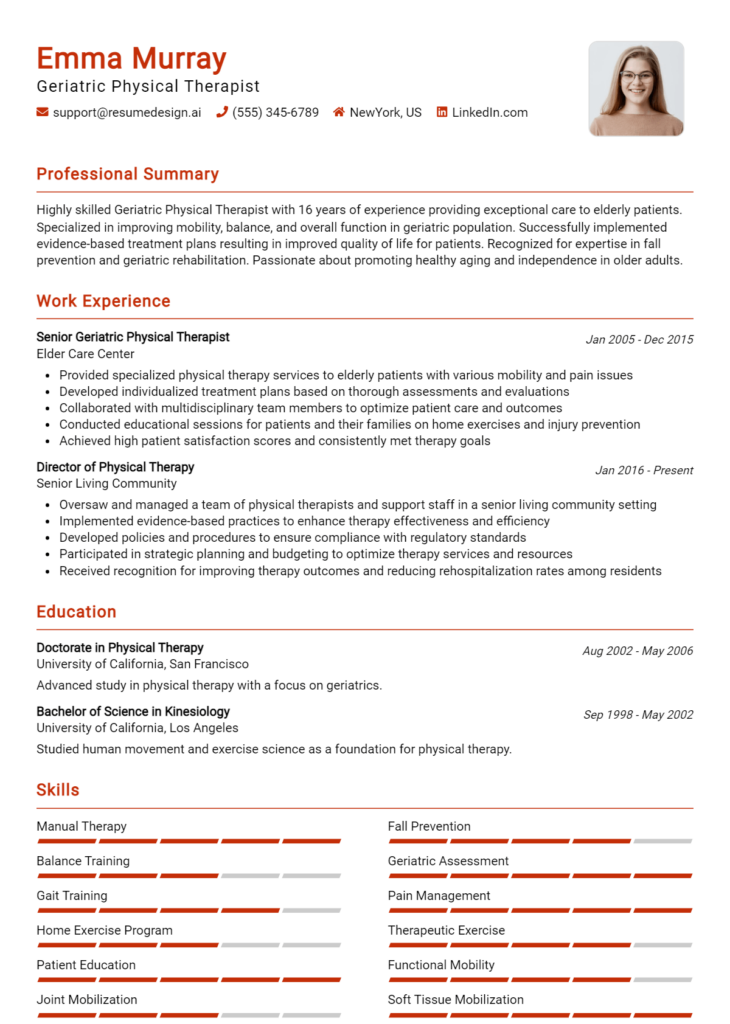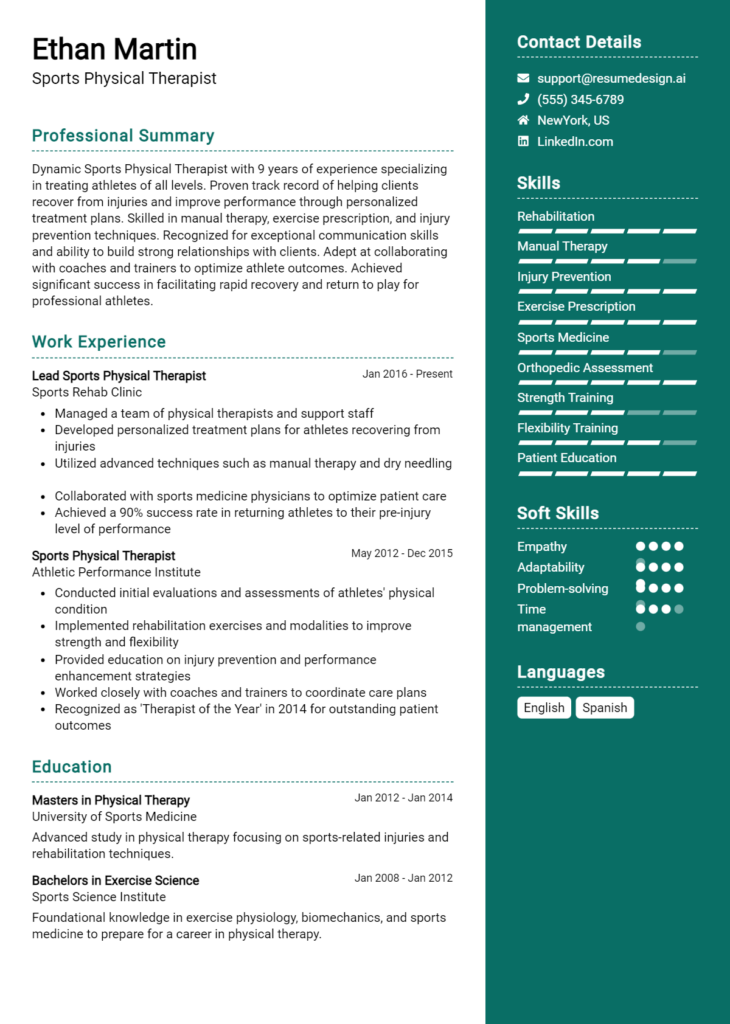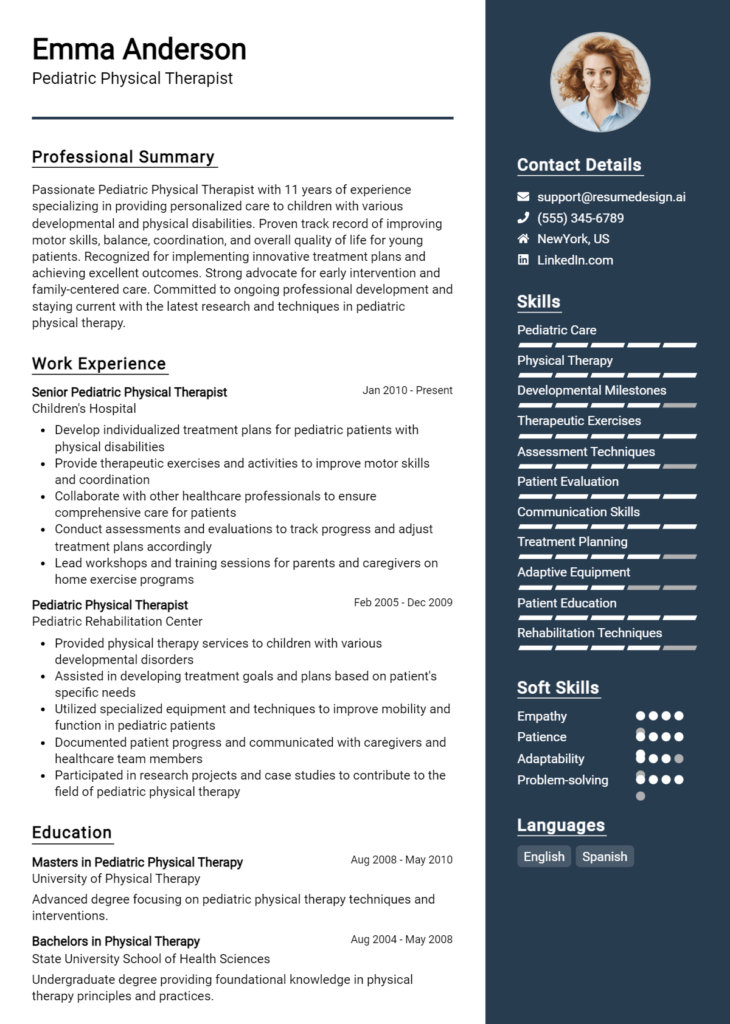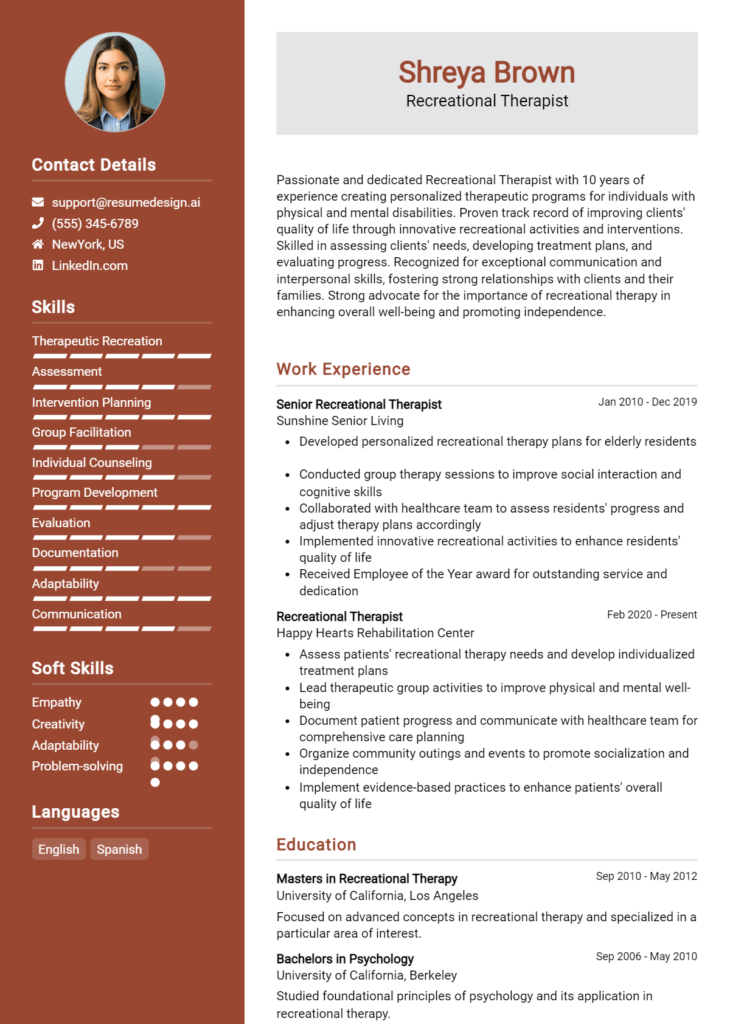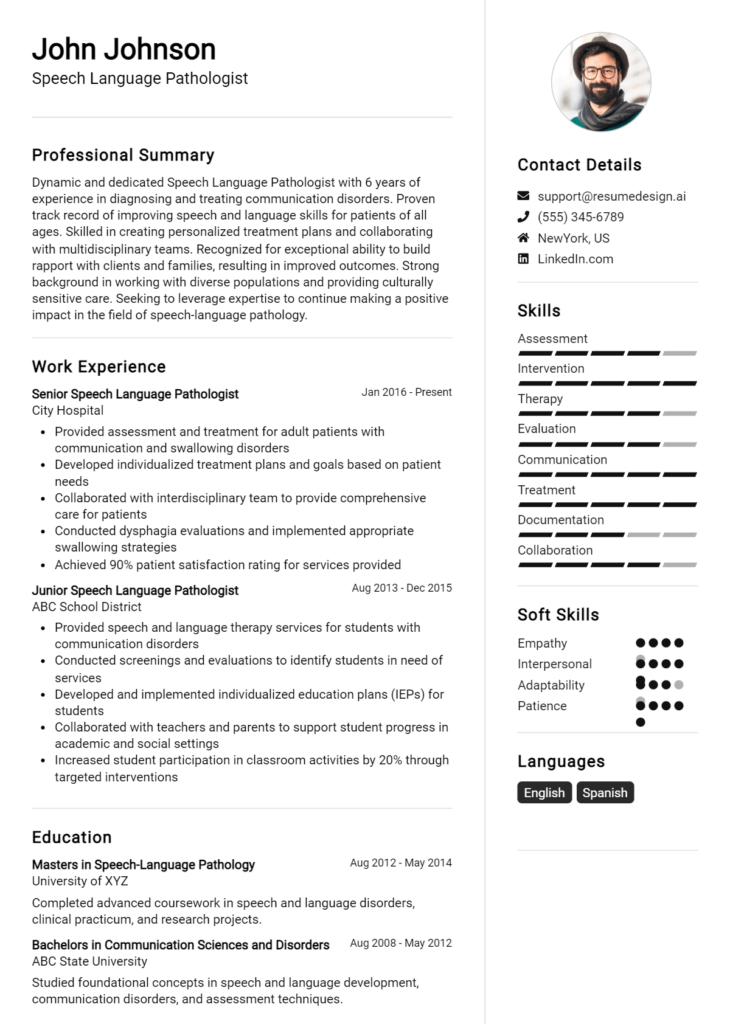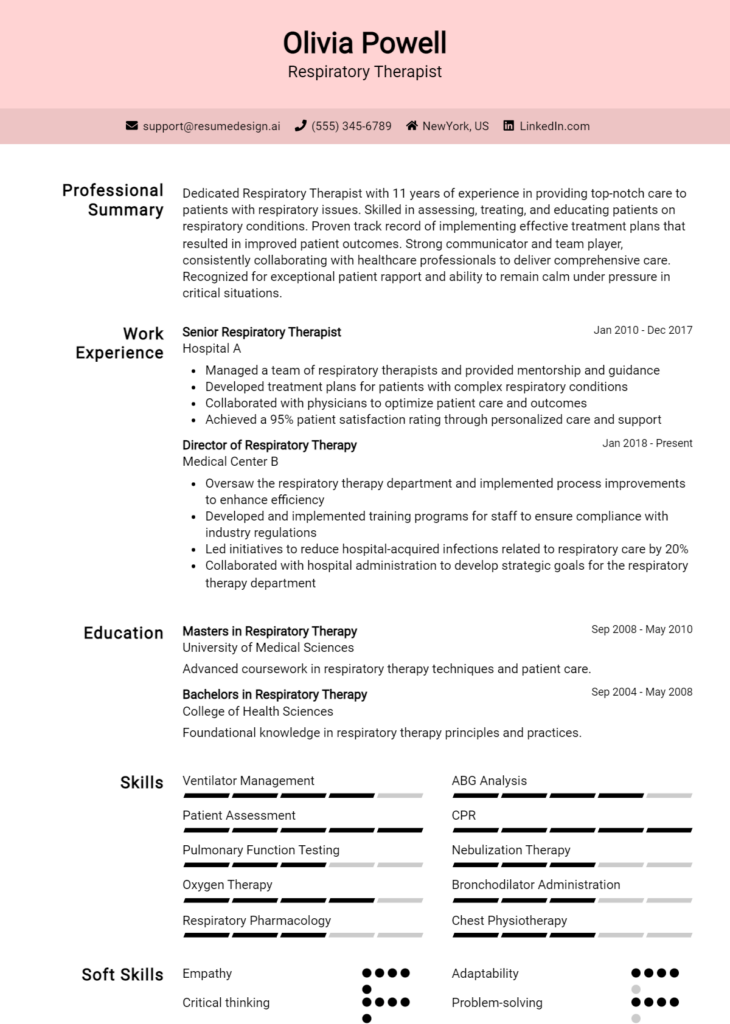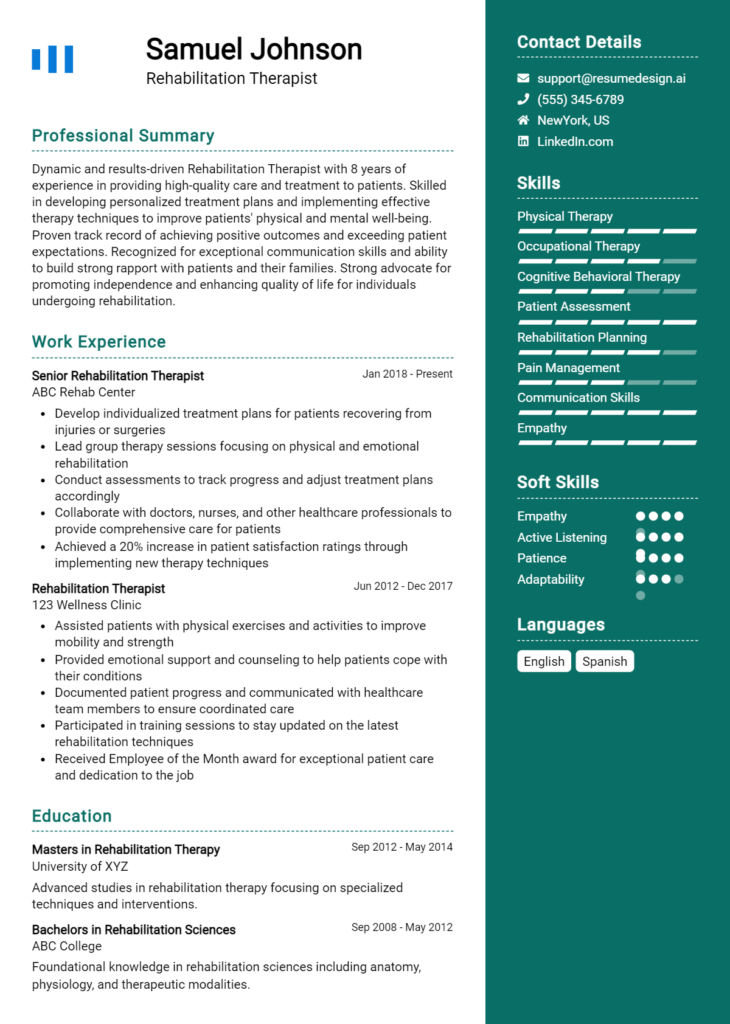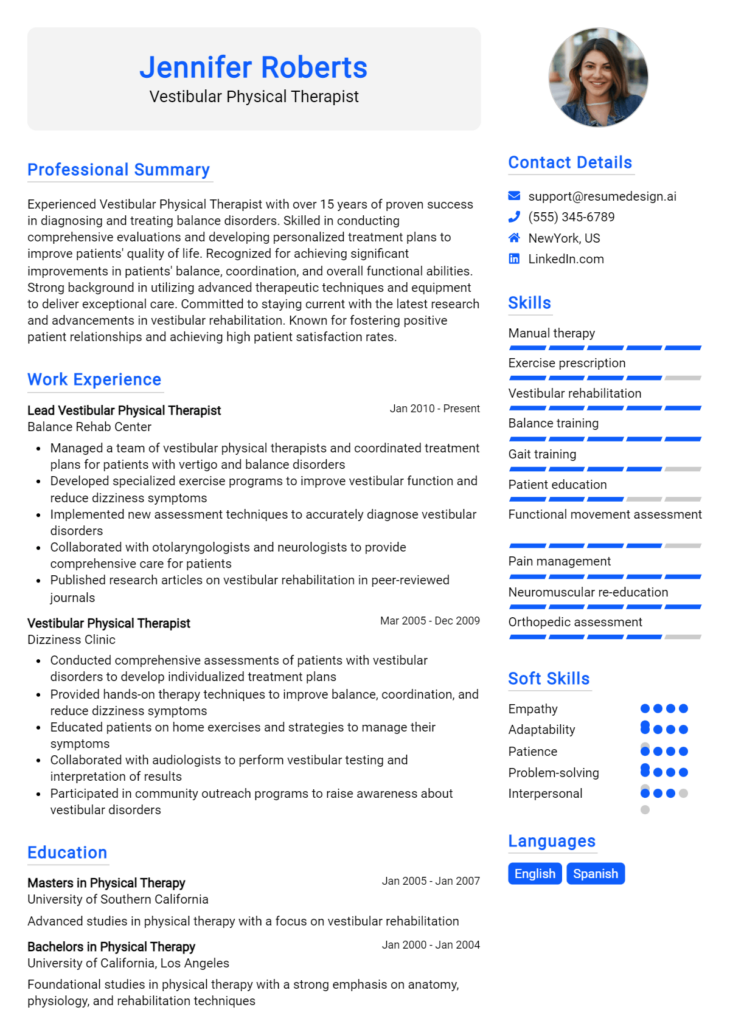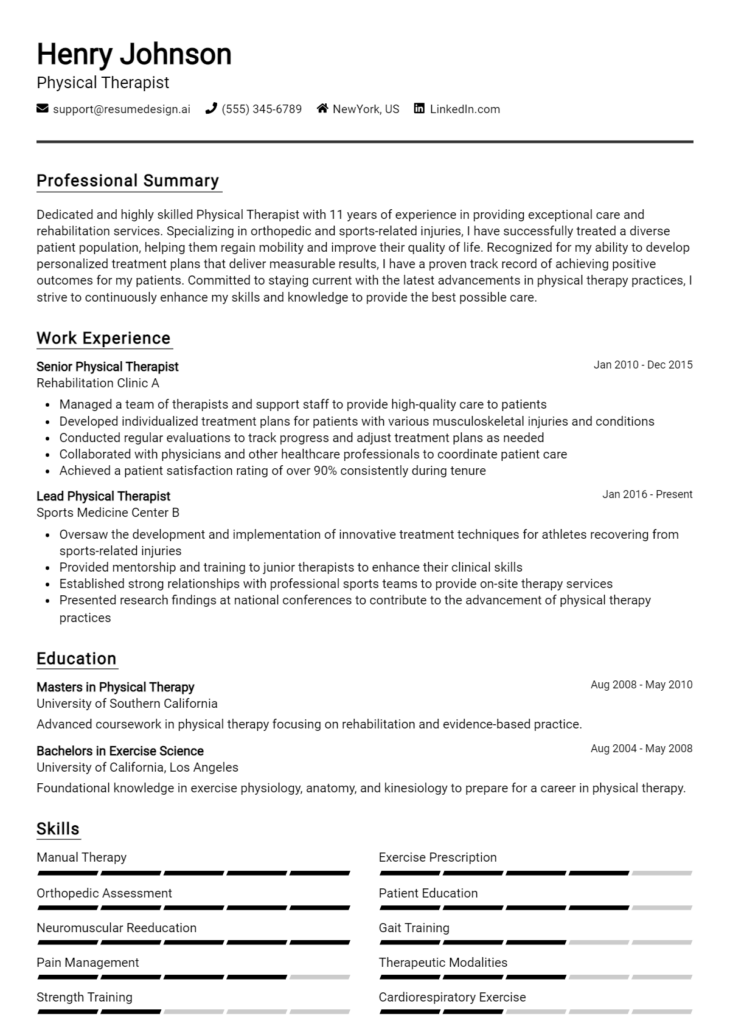Occupational Therapist Core Responsibilities
Occupational Therapists play a crucial role in enhancing patients' quality of life by developing personalized treatment plans that promote independence in daily activities. They bridge various departments, collaborating with healthcare professionals, educators, and families to ensure holistic care. Essential skills include technical proficiency in therapeutic techniques, operational knowledge of healthcare systems, and strong problem-solving abilities to address diverse patient needs. A well-structured resume highlighting these qualifications can significantly contribute to the organization’s overall goals by showcasing the therapist's impact on patient outcomes.
Common Responsibilities Listed on Occupational Therapist Resume
- Conduct comprehensive assessments to evaluate patients' needs and capabilities.
- Develop and implement individualized treatment plans based on patient goals.
- Utilize therapeutic exercises and activities to improve functional skills.
- Collaborate with interdisciplinary teams to coordinate patient care.
- Educate patients and families on treatment strategies and home exercises.
- Monitor and document patient progress, adjusting treatment plans as necessary.
- Provide guidance on adaptive equipment and assistive technology.
- Advocate for patients’ needs within healthcare and educational settings.
- Maintain up-to-date knowledge of best practices and industry advancements.
- Participate in case reviews and contribute to team discussions.
- Foster a therapeutic environment that promotes recovery and well-being.
High-Level Resume Tips for Occupational Therapist Professionals
In the competitive field of occupational therapy, a well-crafted resume is essential for making a strong first impression on potential employers. Your resume serves as a gateway to showcase your unique skills, experiences, and achievements in a concise format. It is often the first document a hiring manager reviews, and it needs to effectively reflect your qualifications and dedication to helping patients achieve their goals. This guide will provide practical and actionable resume tips specifically tailored for Occupational Therapist professionals, ensuring you stand out in a crowded job market.
Top Resume Tips for Occupational Therapist Professionals
- Tailor your resume to each job application by incorporating keywords and phrases from the job description.
- Highlight relevant clinical experience and internships that demonstrate your hands-on skills in various settings.
- Quantify your achievements, such as the number of patients treated or improvements in patient outcomes, to provide concrete evidence of your impact.
- Include industry-specific certifications and licenses, emphasizing any specializations that align with the job requirements.
- Showcase your soft skills, such as communication and empathy, which are crucial in building rapport with patients.
- Utilize a clean, professional format that enhances readability and makes essential information easy to locate.
- Incorporate a summary statement that encapsulates your professional philosophy and key competencies in occupational therapy.
- List professional affiliations and memberships in relevant organizations to demonstrate your commitment to ongoing education and networking.
- Ensure your resume is free from grammatical errors and typos, as attention to detail reflects your professionalism.
By implementing these tips, you can significantly enhance your resume and increase your chances of landing a job in the Occupational Therapist field. A well-structured resume that clearly communicates your qualifications and achievements will not only attract the attention of hiring managers but also position you as a strong candidate ready to make a positive impact in the lives of your future patients.
Why Resume Headlines & Titles are Important for Occupational Therapist
In the competitive field of occupational therapy, a well-crafted resume headline or title can serve as a powerful first impression for hiring managers. These concise phrases are crucial because they succinctly summarize a candidate's key qualifications and areas of expertise in just a few words. A strong headline immediately grabs attention and can set the tone for the rest of the resume, making it clear that the candidate possesses the relevant skills and experiences necessary for the role. By being relevant and directly related to the job being applied for, a compelling headline can significantly enhance a candidate's chances of being noticed in a crowded job market.
Best Practices for Crafting Resume Headlines for Occupational Therapist
- Be concise: Limit your headline to a few impactful words that capture your essence.
- Focus on relevance: Tailor your headline to the specific job description and requirements.
- Highlight key qualifications: Include your strongest skills or areas of expertise that align with the role.
- Use action-oriented language: Choose dynamic verbs or phrases that inspire confidence.
- Incorporate keywords: Utilize industry-specific terms that can resonate with hiring managers and applicant tracking systems.
- Showcase unique selling points: Bring attention to any certifications, specializations, or achievements that differentiate you.
- Avoid jargon: Keep the language professional but accessible to ensure clarity.
- Test readability: Ensure your headline stands out visually and is easy to read at a glance.
Example Resume Headlines for Occupational Therapist
Strong Resume Headlines
"Experienced Occupational Therapist Specializing in Pediatric Rehabilitation"
“Certified Occupational Therapist with 5+ Years in Geriatric Care and Rehabilitation”
“Dynamic Occupational Therapist with Expertise in Neurological Recovery and Patient-Centered Care”
Weak Resume Headlines
“Occupational Therapist Looking for Work”
“Therapist with Experience”
The strong headlines are effective because they clearly articulate the candidate's specific strengths and areas of specialization, making them immediately relevant to hiring managers. They convey a sense of professionalism and expertise that is likely to resonate with employers seeking qualified occupational therapists. In contrast, the weak headlines fail to create a compelling impression; they are too vague and generic, lacking the detail and specificity that would help a candidate stand out in the hiring process. By not highlighting unique qualifications or relevant skills, these weak titles miss the opportunity to engage potential employers effectively.
Writing an Exceptional Occupational Therapist Resume Summary
A well-crafted resume summary is crucial for Occupational Therapists as it serves as the first impression to hiring managers. This concise statement quickly captures attention by showcasing key skills, relevant experience, and notable accomplishments tailored to the specific job. A strong summary not only highlights the candidate’s qualifications but also sets the tone for the rest of the resume, making it essential for standing out in a competitive job market.
Best Practices for Writing a Occupational Therapist Resume Summary
- Quantify Achievements: Incorporate specific numbers or percentages to showcase the impact of your work.
- Focus on Relevant Skills: Highlight skills that are directly related to the job description.
- Be Concise: Keep your summary brief, ideally 2-4 sentences, to maintain the hiring manager's attention.
- Use Action Verbs: Start with strong action verbs to convey confidence and proactivity.
- Tailor for the Job Description: Customize your summary for each application to align with the employer's needs.
- Showcase Certifications: Mention relevant licenses or certifications that enhance your qualifications.
- Highlight Unique Qualifications: If applicable, include any specialized training or unique experiences.
- Maintain Professional Tone: Ensure the summary is professional and free from jargon or overly casual language.
Example Occupational Therapist Resume Summaries
Strong Resume Summaries
Dedicated Occupational Therapist with over 5 years of experience in pediatric rehabilitation. Successfully improved patient mobility by 40% through tailored therapy programs and innovative techniques.
Compassionate and results-driven Occupational Therapist adept at creating individualized treatment plans. Achieved a 95% patient satisfaction rate and enhanced functional independence for over 200 clients in a community health setting.
Licensed Occupational Therapist specializing in geriatrics with a proven track record of reducing fall risk by 30% in clients through comprehensive assessments and personalized intervention strategies.
Weak Resume Summaries
Occupational Therapist with some experience looking for a new job.
I am a motivated professional seeking opportunities in occupational therapy to help patients recover.
The strong summaries are effective because they provide specific, quantifiable outcomes and directly relate to the role of an Occupational Therapist. They emphasize relevant skills, experiences, and achievements that demonstrate the candidate's value. In contrast, the weak summaries lack detail, specificity, and measurable results, making them less impactful and memorable for hiring managers.
Work Experience Section for Occupational Therapist Resume
The work experience section of an Occupational Therapist resume plays a critical role in demonstrating a candidate's qualifications and suitability for the position. This section not only showcases the technical skills acquired through various experiences but also illustrates the ability to manage teams and deliver high-quality therapeutic services. By quantifying achievements and aligning past experiences with industry standards, candidates can effectively communicate their value to potential employers, setting themselves apart in a competitive job market.
Best Practices for Occupational Therapist Work Experience
- Highlight specific technical skills relevant to occupational therapy, such as patient assessment, treatment planning, and adaptive equipment usage.
- Use quantifiable metrics to illustrate success, such as percentage improvements in patient mobility or satisfaction ratings.
- Emphasize collaboration with interdisciplinary teams, showcasing your ability to work alongside other healthcare professionals.
- Detail leadership roles or initiatives taken that demonstrate your ability to manage and mentor others.
- Include certifications or specialized training that enhances your qualifications and sets you apart.
- Tailor your experiences to align with the job description, using keywords and phrases that resonate with the employer.
- Focus on outcomes of your interventions, showing how your contributions made a difference in patients' lives.
- Use action verbs to convey your responsibilities and achievements effectively.
Example Work Experiences for Occupational Therapist
Strong Experiences
- Developed individualized treatment plans for over 30 patients, resulting in a 40% improvement in functional mobility within six months.
- Led a team of 5 therapists in a community outreach program, increasing patient enrollment by 25% and enhancing access to care.
- Implemented a new adaptive equipment training program, which reduced patient injury rates by 15% and improved overall satisfaction scores.
- Facilitated weekly interdisciplinary meetings to coordinate patient care, leading to a 20% reduction in hospital readmissions.
Weak Experiences
- Worked with patients to help them improve.
- Assisted in various therapy sessions.
- Participated in team meetings.
- Helped with patient assessments.
The examples listed as strong experiences demonstrate clear, quantifiable achievements and specific technical leadership roles, which effectively highlight the candidate's capabilities and contributions to patient care. In contrast, the weak experiences provide vague descriptions that lack detail and measurable outcomes, making it difficult for potential employers to gauge the candidate's impact in previous roles. Strong experiences provide clarity and demonstrate the applicant’s expertise, while weak experiences fail to convey meaningful information.
Education and Certifications Section for Occupational Therapist Resume
The education and certifications section of an Occupational Therapist resume plays a pivotal role in showcasing a candidate's academic credentials, specialized training, and commitment to continuous professional development. This section not only highlights the foundational knowledge acquired through formal education but also emphasizes the relevance of industry-recognized certifications. By detailing relevant coursework and any specialized training, candidates can significantly enhance their credibility and demonstrate alignment with the specific requirements of the job role. A well-structured education and certifications section can set candidates apart in a competitive job market, reflecting their dedication to providing high-quality care and staying updated with the latest practices in occupational therapy.
Best Practices for Occupational Therapist Education and Certifications
- List your highest degree first, ensuring it is relevant to occupational therapy.
- Include only current and recognized certifications that are relevant to the field.
- Provide details about specialized training or workshops that enhance your qualifications.
- Highlight any continuing education courses that demonstrate your commitment to professional growth.
- Be specific about relevant coursework, particularly those that align with job requirements.
- Utilize industry-standard abbreviations and terminology for certifications to enhance clarity.
- Consider including your graduation date, especially if it is recent, to indicate up-to-date knowledge.
- Keep this section concise and focused, avoiding extraneous information that may dilute key qualifications.
Example Education and Certifications for Occupational Therapist
Strong Examples
- Master of Science in Occupational Therapy, University of Health Sciences, Graduated May 2022
- Licensed Occupational Therapist (OTR) – National Board for Certification in Occupational Therapy, 2022
- Certified Hand Therapist (CHT) – Hand Therapy Certification Commission, 2023
- Coursework in Pediatric Occupational Therapy and Neurorehabilitation, University of Health Sciences
Weak Examples
- Bachelor of Arts in Psychology, University of Social Sciences, Graduated 2015 (not directly related)
- Certification in First Aid and CPR (not specific to occupational therapy)
- Certificate in Basic Massage Techniques, Completed 2018 (irrelevant to OT practice)
- High School Diploma, Graduated 2010 (not relevant for professional roles)
The examples listed as strong are considered effective because they directly relate to the qualifications and skills necessary for an Occupational Therapist role. They demonstrate advanced education, relevant certifications, and specialized training that align with industry standards. In contrast, the weak examples are ineffective as they include degrees and certifications that do not pertain to occupational therapy, thus failing to establish the candidate's suitability for the position. Presenting strong examples helps to build a compelling case for a candidate's expertise and readiness for the role.
Top Skills & Keywords for Occupational Therapist Resume
As an Occupational Therapist, showcasing the right skills on your resume is crucial for standing out in a competitive job market. Potential employers look for a blend of hard and soft skills that demonstrate your ability to provide effective therapy, communicate well with clients, and collaborate with healthcare teams. Highlighting these skills not only reflects your qualifications but also gives insight into your approach to patient care and rehabilitation. A well-crafted resume that emphasizes your abilities can significantly increase your chances of landing an interview and ultimately securing a position in this rewarding field.
Top Hard & Soft Skills for Occupational Therapist
Soft Skills
- Empathy
- Communication
- Patience
- Adaptability
- Problem-solving
- Teamwork
- Time management
- Active listening
- Conflict resolution
- Compassion
Hard Skills
- Knowledge of therapeutic techniques
- Patient assessment
- Treatment planning
- Manual dexterity
- Use of adaptive equipment
- Documentation and record-keeping
- Knowledge of anatomy and physiology
- Occupational therapy modalities
- Research and evidence-based practice
- Familiarity with healthcare regulations
By ensuring that your resume includes the necessary skills and demonstrates relevant work experience, you can create a compelling narrative that showcases your qualifications as an Occupational Therapist.
Stand Out with a Winning Occupational Therapist Cover Letter
Dear [Hiring Manager's Name],
I am writing to express my interest in the Occupational Therapist position at [Company Name] as advertised on [Where You Found the Job Posting]. With a Master's degree in Occupational Therapy from [Your University] and over [X years] of experience working with diverse populations, I am confident in my ability to contribute effectively to your team. My passion for helping individuals regain their independence and improve their quality of life aligns perfectly with the mission of [Company Name], making me an ideal candidate for this role.
In my previous position at [Previous Employer], I successfully developed and implemented personalized treatment plans for clients with various disabilities, including physical injuries, developmental disorders, and age-related challenges. By employing evidence-based practices and collaborating closely with interdisciplinary teams, I was able to achieve measurable improvements in my clients’ functional abilities. For instance, I initiated a community outreach program that provided workshops on adaptive strategies, leading to a 30% increase in client engagement and satisfaction. I am eager to bring this proactive approach to [Company Name] and work with your dedicated staff to enhance patient outcomes.
I am particularly impressed by [Company Name]'s commitment to holistic care and community involvement. I believe that my strong communication skills and empathetic nature allow me to connect with clients and their families, fostering a supportive environment that encourages progress. I am excited about the opportunity to contribute to your team and help clients achieve their goals through innovative therapy techniques and compassionate care.
Thank you for considering my application. I look forward to the possibility of discussing how my skills and experiences align with the needs of [Company Name]. I am eager to bring my expertise in occupational therapy to your organization and help make a positive impact on the lives of your clients.
Warm regards,
[Your Name]
[Your Phone Number]
[Your Email Address]
Conclusion
As we explored the vital role of Occupational Therapists, we highlighted the diverse skills and qualifications that make professionals in this field indispensable. From assessing patient needs to developing personalized treatment plans, Occupational Therapists play a crucial role in helping individuals regain independence and improve their quality of life. We also discussed the importance of effective communication, empathy, and ongoing education in this profession.
To ensure you stand out in this competitive job market, it's essential to have a polished and professional resume that accurately reflects your skills and experiences. We encourage you to take a moment to review your Occupational Therapist resume. Are your accomplishments clearly highlighted? Is your format clean and easy to read?
To assist you in this process, there are valuable resources available. Check out resume templates to find a design that suits your style. You can also utilize the resume builder for a guided experience in creating a standout resume. For additional inspiration, browse through our resume examples tailored specifically for Occupational Therapists. Don't forget to complement your resume with a strong introduction by using our cover letter templates.
Take the next step in your career today by ensuring your resume reflects the incredible work you do as an Occupational Therapist!

